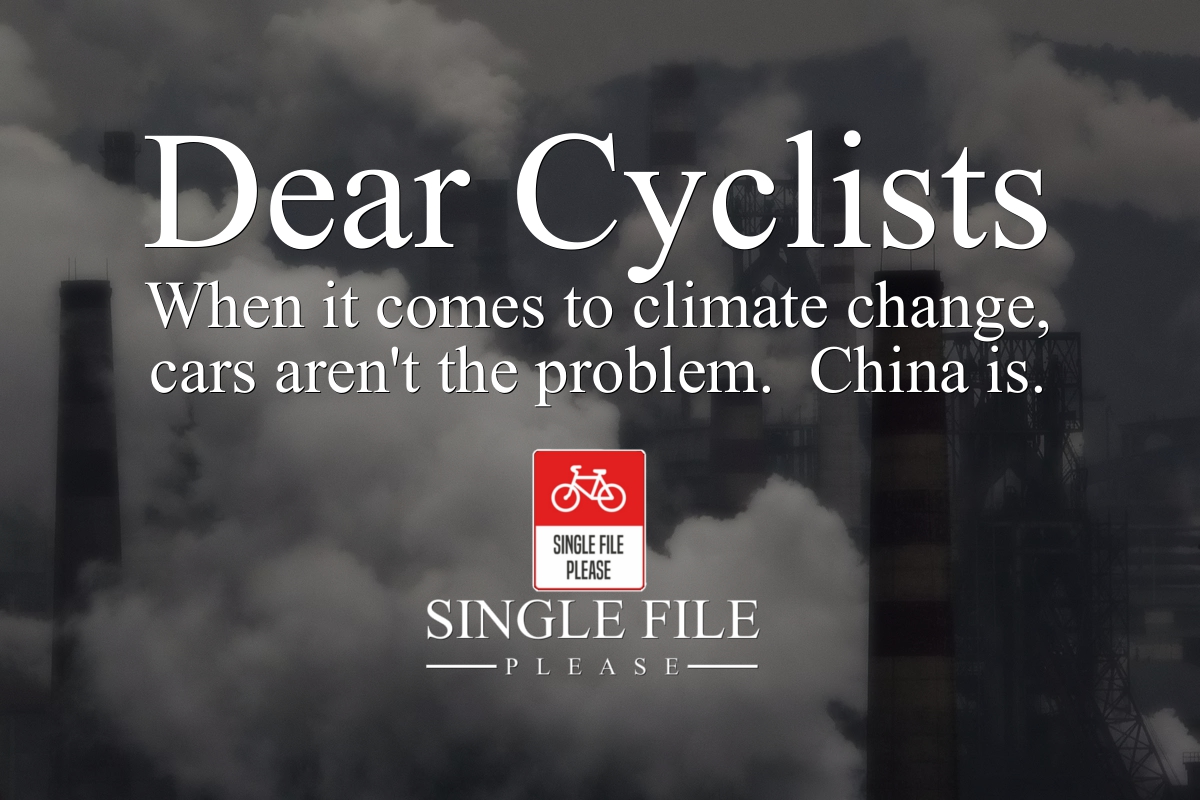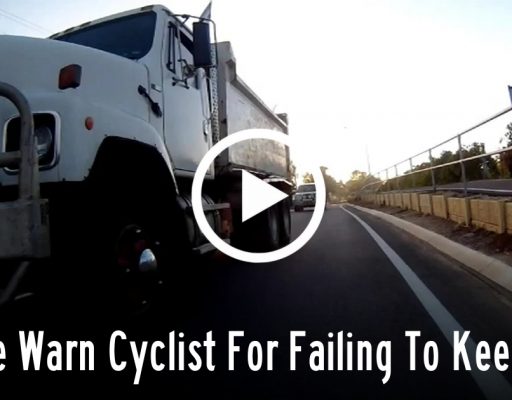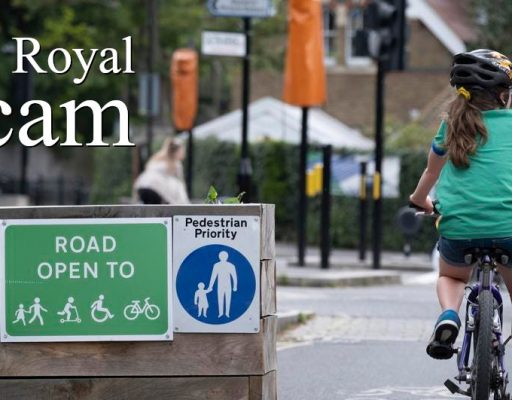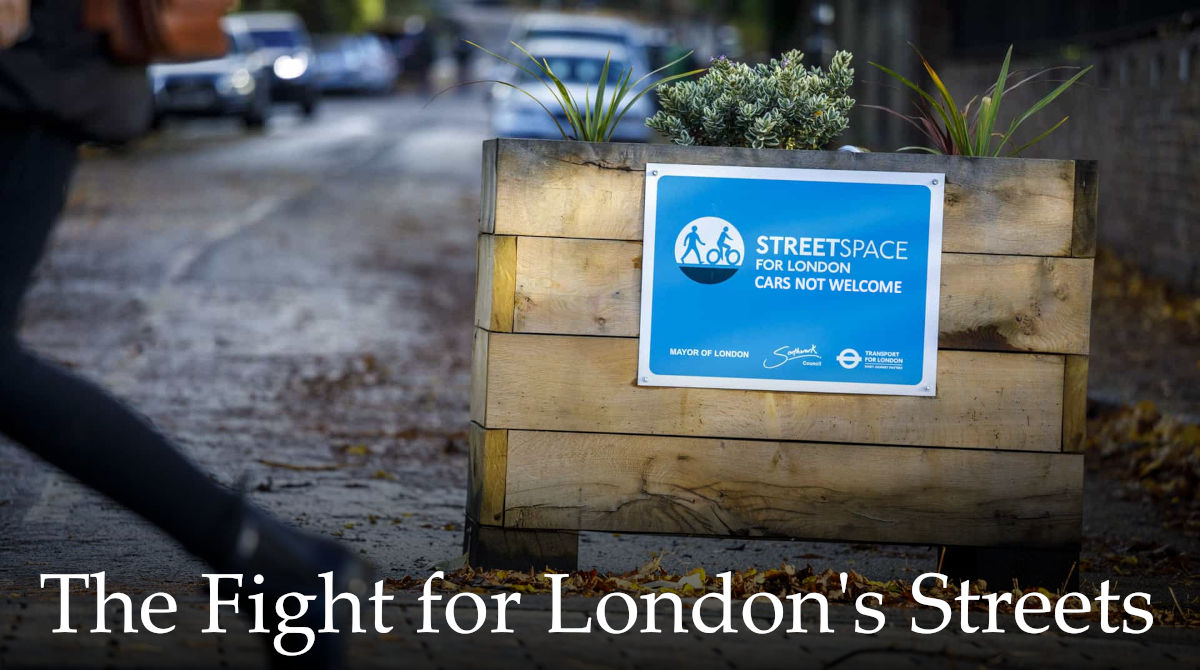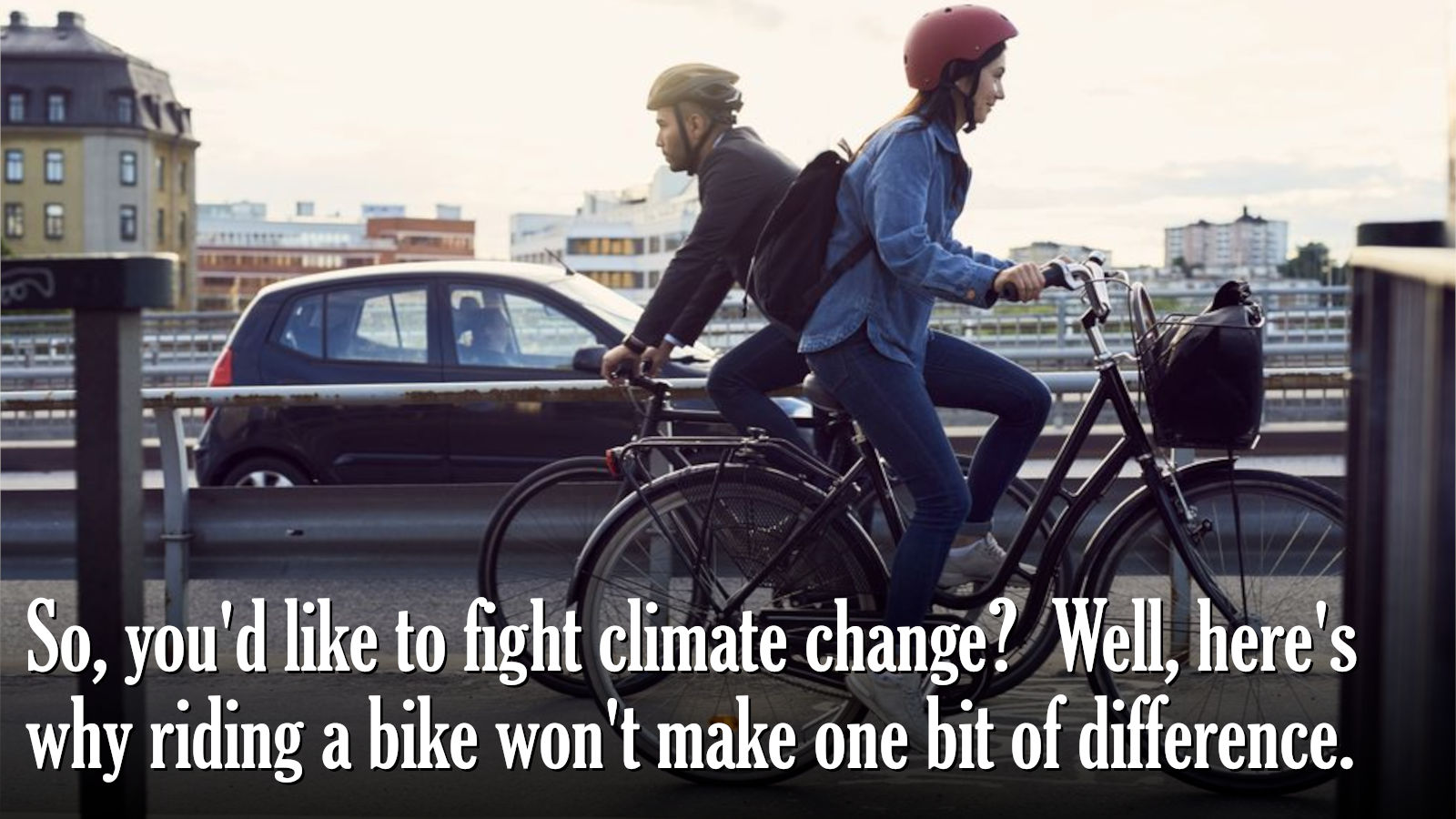Occasionally cyclists say things which are so naive and so biased it makes you feel like pulling your hair out in pure exasperation. At the moment, every time I hear a cyclist shout the words “We need to fight climate change, we need less cars!” it reinforces my belief cyclists simply have no idea.
Let’s get some facts out of the way before we go any further. Australia produces roughly 1% of the world’s greenhouse emissions each year. Of all the greenhouse emissions produced by Australia every year, motorised transport (in it’s various forms) accounts for a mere 4.9% of the total. And this, in a nation which is highly dependent upon the motor vehicle as it’s mass transit system.
Conversely, if you take the three leading industrial sectors of Australian emissions; electricity production, mining, and manufacturing, those three sectors account for 92% of all the CO2 emissions Australia produces each year. Which is another way of saying cycling advocates are full of crap.
But first, some background. You might recall Australia was hit very hard by wildfires at the start of the year. Recently, Adam Spencer hosted a Triple J think tank segment on the sorts of things Australia could possibly do to help fight global climate change.
As the comments started to rage back and forth, it didn’t take long for well known cycling advocates like Vicki Coughlan to leap at the opportunity to push their cynical anti-car agenda as hard as they could. Coughlan is an Admin for the Australian Cycling Alliance website, a noted left leaning supporter of the Greens, so her bias is beyond question.
As per usual, the ubiquitous Peter Signorini (one of Australia’s more obnoxious online cycling pests) was right there to provide back up. But Vicki is smart. In the following exchange, note how she doesn’t let on she’s a hard core cyclist. But she DID take aim directly at her pet hate – cars.
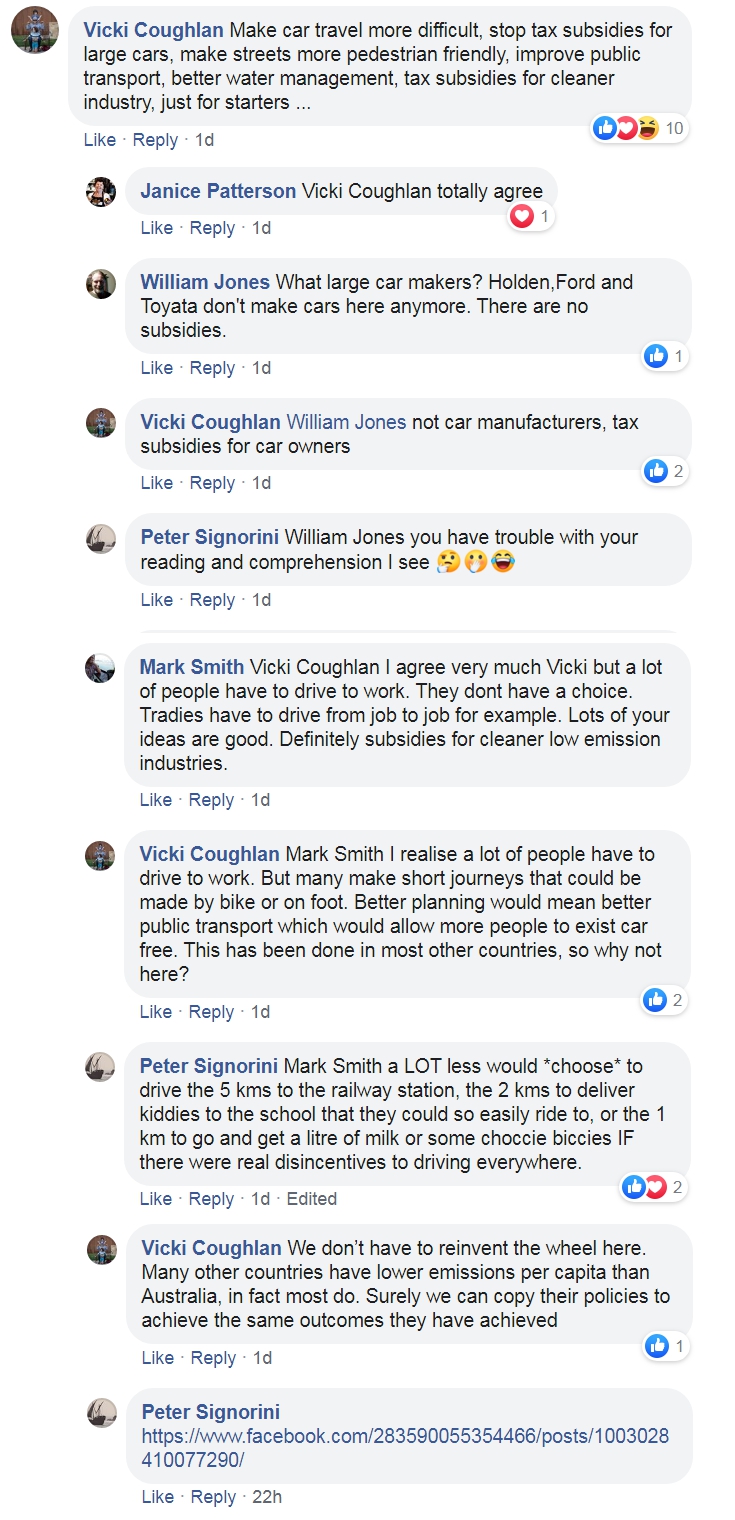
Did you see what Vicki did there in her final comment? Can you see where she threw in Australia’s CO2 emissions per capita figure? It was subtle and she was able to do it without disclosing her cycling background, but that’s how the logical fallacy worked in this instance.
First she made a claim which was untrue – reduce the number of cars in Australia to help improve global warming – and then she mentioned Australia’s CO2 emissions per capita. You’re tempted to think both claims are true, but they’re aren’t. The first claim is false, but the second claim (which is true) attempts to validate the first. That’s how logical fallacies work.
The problem is cyclists keep lying to themselves. And your typical Australian motorist knows it. What cyclists really want is more funding for a separate road system for cyclists “just like they have in Holland.” The imminent threat of climate change is little more than a cynical excuse to push that particular agenda.
Geoff Baird, Single File Please
So how did we get here? How did we get to a point where cyclists are ignoring science and facts at the same time? It's as if all they need to do is tell the same lie three times and they start to believe it themselves.
In 2018 American cycling journalist Danielle Zickl wrote a piece for Bicycling Magazine which argued the single most effective way to fight climate change would be to get people out of cars and onto bikes instead. Now, some things to note here…. the piece was written for cyclists AND it was written for Bicycling Magazine so quite predictably the article was always going to be biased. Cyclists love to read articles which confirm their existing biases.
As noted in this article about a whiny old fart who reckons cyclists are copping too many fines, logical fallacies are rife amongst the cycling world, and perhaps none are as spurious as the claim which argues Australians should use bikes instead of cars to help fight climate change.
In the short time since Danielle Zickl wrote her article, she has become the darling of the cycling world. Recreational cyclists all over the globe have latched on to a myth which argues more cyclists on our roads will actually make a difference to greenhouse emissions.
Lets break down the logic being used Danielle Zickl... and why her article has become so popular among cyclists who, quite frankly, are often as naive as Greta Thunberg.
- Claim (A) says automobiles pump out carbon-dioxide through their exhaust pipes. OK, on it’s face, technically correct. This is how logical fallacies work.
- Claim (B) says for every person who starts riding a bicycle we’ll see a reduction in CO2 emissions. It would be nice if it was true but the logic makes no allowance for annual population growth in the form of total registered vehicles. Australia currently adds 420,000 more cars to our roads every year. If you’re only getting 10,000 people to migrate to cycling each year, that’s still 410,000 more cars pumping out more CO2 than the year before.
- Claim (C) says, in any event, we won’t be able to pursuade people to take up cycling in the millions because it’s still not safe enough yet, hence before we can fight CO2 emissions through bicycle use, first we need to massively ramp up spending on cycling infrastructure so that people will feel safe enough to take up cycling.
According to Zickl, we *possibly* might be able to offset greenhouse emmissions through cycling, but it will require hundreds of millions of people worldwide to start riding bicycles. Think about that for a moment. That’s a BIG ask. Here in Australia, in 4 years from now we’ll have 1.4 million MORE cars on our roads than we do today. To keep Australia’s car numbers just on a par with today’s levels (let alone reducing them), we’ll need 1.4 million Australians to start riding to work in the next 4 years. And this in circumstances where a tiny 107,000 Australians put their hand up during the 2016 Census and said “Yeah, I rode a bike to work today.”
But wait a moment... isn't coal powered electricity the number one problem? Specifically, isn't coal powered electricity in China the world's number one problem?
Well yes, in the context of targeting the world’s biggest producers of greenhouse emissions, coal powered Chinese electricity plants are indeed the problem, and a reduction in Australia’s car usage is equivalent to a grain of sand on a twenty mile beach. So let’s take a look at a list of the world’s Top 100 most polluted cities.
Pollution takes two forms generally – airborne pollution and land based pollution. Of the world’s 100 most polluted cities, 57 exist in China, 38 exist in India, and precisely ZERO are in Australia. By any yardstick, the latest data confirms Asia has a major crisis on its hands when it comes to air pollution. And just two countries, China and India, manage to produce over 36% all the world’s harmful greenhouse emissions each year.
If you know your facts, Australian cyclists look rather silly when they claim less cars on Australian roads will help fight climate change. Hence, we need to be quite honest here… if cyclists were truly serious about reducing Australia’s contribution to global CO2 emissions they would be pushing for a reduction in Australia’s coal exports.
Australia is the world’s 2nd biggest exporter of coal per annum. And what happens to that coal? It gets burnt, and greenhouse emissions get produced on an almost apocalyptic scale. But cyclists aren’t truly serious about reducing greenhouse emissions – not really. The reality is they’re cynically exploiting the climate crisis to push their agenda for less cars on the road.
Australian's enjoy an excellent lifestyle. Australia is a nation full of world class facilities, rich with opportunity and accessible education, a nation blessed with a magnificent health system and a terrific social welfare safety net. All of which costs LOTS of money. Your typical Australian cyclist is fully aware how much they owe the mining industry for their quality of life. Which is why they're happy to cynically push for lower car numbers but they're also happy to keep exporting coal.
GEOFF BAIRD, SINGLE FILE PLEASE
Is it true Australia is one of the world's highest emitters of CO2 on a per capita basis? Is that not something we need to address? Is that not something we should be ashamed of?
Well, the honest answer is both yes and no, all at the same time. On the one hand it’s true Australia is one of the world’s highest producers of CO2 per person, but it’s also true Australia produces only 1% of the world’s CO2 each year. Hence, a better question is why is Australia one of the world’s highest emitters of CO2, but only if we define it on a per capita basis? Are we backward? No, not at all. It has to do with alternatives. We simply weren’t blessed with many alternatives to coal powered electricity during our major growth years. But I’ll expand upon that later.
For now, I’d like to focus on the flawed logic used by cyclists in their pursuit of less cars on Australia’s roads. It’s always the same modus operandi – cyclists keep reaching for any logical fallacy they can find to justify either a reduction in the number of cars on our roads, and/or to justify an increase in cycling infrastructure funding. In the exchange above by Vicki Coughlan, that’s exactly what she did when she dragged out the “Australia emissions per capita” fallacy.
To prove my point, take a look at the next graph. Every time you get into a debate with an Australian cyclist about solving the global warming problem, they’ll happily pull this graph out and whack you around the head with it, and then they’ll follow that up with “See, that’s your proof we need less cars on the road!”

OK, so looking at CO2 emissions on a per capita basis can be misleading, but that still doesn't address the cycling issue. Can cycling actually make a difference?
An excellent question, so let’s take a moment to see where The Netherlands sits in the previous graph. This is where it gets funny. If you’re a cyclist the Dutch can do no wrong. Everything is better in The Netherlands, supposedly. And yet The Netherlands has the worst CO2 emissions figure in all of the EU, with a per capita figure 36% higher than the EU average.
Clearly there’s a disconnect here. According to Australian cyclists, CO2 emissions are caused by evil nasty cars, and they simply have to go. But why then does The Netherlands have such a disastrous greenhouse emissions figure? After all, car ownership in The Netherlands is the lowest in all of Europe. Indeed 35% of all Dutch adults ride a bike to work.
Dutch car ownership is low, so why do they have such high CO2 emissions per capita? Well, the reason is CO2 emissions in The Netherlands is NOT a function of car use, rather, it’s actually a function of electricity production. This is where most cycling advocates stare at their feet and go rather quiet.
In fairness to The Netherlands, their CO2 emissions per capita used to be a lot worse. They’ve implemented cleaner power plant technology in the last decade and their figures have improved. Nonetheless they still use coal powered electricity, and just like China, the vast majority of Australia’s CO2 emissions are caused by coal powered electricity, not cars. Due to our overnight Base Load requirements, Australia doesn’t have many real world alternatives in the foreseeable near future apart from natural gas. We don’t have massive exposure to hydro electric production, nor does Australia have massive exposure to geo-thermal electricity or any exposure to nuclear powered electricity.
Australian cyclists love to use the "CO2 emissions per capita" claim as a guilt trip on motorists, but when you finally understand how small the role is that cars play in WHY Australia has such a high CO2 emissions per capita figure, that's when you realise it's actually a classic red herring argument.
GEOFF BAIRD, SINGLE FILE PLEASE
Part Six:- The Final Word
Yes, in the Western World it’s possible to reduce our CO2 emissions per capita, but if we’re going to focus on that, we need to be honest and focus on the most effective solutions instead of red herrings. And that means reducing our Base Load. It’s always about the Base Load.
It’s true Australia could definitely improve by transitioning from dirty coal powered electricity to cleaner natural gas electricity. That’s the program The Netherlands adopted. To be frank it’s a mystery why that program hasn’t been rolled out in the past decade. It’s not as though we didn’t know our coal powered electricity plants were aging and getting closer to obsolescence.
Whatever happens however, Australia has a massive overnight base load which has to be met. It’s what keeps our cities alive at night. At 4am in the morning, wind and solar power are obviously negligible, and there’s the rub. Sure, it’s theoretically possible to build enough solar farms and wind farms to generate in excess of 100% of our peak requirements at 2pm each day at the height of summer, but 2pm in the afternoon isn’t the problem. It’s the ability to supply 60% of that peak figure at 4am in the morning which needs to be maintained, and right here at today’s date, excess storage capacity in the form of massive battery farms aren’t able to meet that overnight Base Load requirement. Possibly in 20 years it might happen, it would be great if it does happen, but it’s not possible in Australia at today’s date. Whether we like it or not Australia will remain a prisoner to hydrocarbon based electricty in the near term future. For now, it’s either meet the minimum overnight Base Load requirement or suffer a reduction in public resources.
It’s true Australia could definitely improve by transitioning from dirty coal powered electricity to cleaner natural gas electricity. That’s the program The Netherlands adopted. To be frank it’s a mystery why that program hasn’t been rolled out in the past decade. It’s not as though we didn’t know our coal powered electricity plants were aging and getting closer to obsolescence.

In closing, cycling is a wonderful pastime, but we’ve entered a ridiculous era where people are claiming cycling can solve our congestion crisis. For the fantasy to come true, all we need to do first is build a multi-billion dollar separate road system just for cyclists. You know, like they have in Holland. A separate road system which ALL Australians will need to pay for, whether they ride bikes or not. It’s understandable why cycling lobbyists are inclined to believe that sort of rubbish. The scary part is people in government are actually listening to these fools.
If global warming is indeed a thing, if it’s actually being caused by global CO2 emissions, it’s pure bullshit to claim a reduction in the number of cars on Australia’s roads will make a difference to climate change. That’s a claim which is little more than a cynical exploitation of our recent bush fire crisis. It’s unbelievably cynical. Cyclists would be better off simply being honest and saying they want less cars on the roads so they can have the roads more to themselves.
